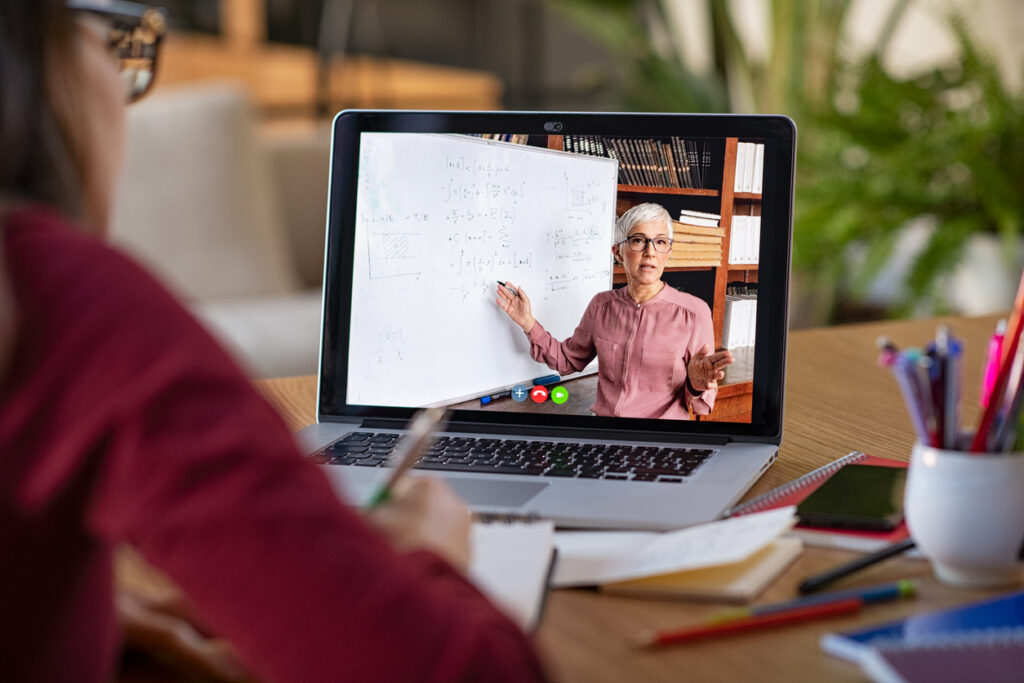Behavioural science says that a great time to form a new habit is at the moment of a major life event. Well, we’re all having a pretty major life event right now, aren’t we? We’re all being forced to do things that might do us good in the long-term if we keep at them, like planning our meals, or doing an hour’s exercise a day. Lots of us in L&D have also been forced at breakneck speed into virtual training, so is that a habit we want to stick with?
Zoom in and zoom out
It’s interesting to consider the things have worked about training via video conferencing, and some of them are subtle changes. For example, I’ve enjoyed the intimacy of listening to people talk through headphones, and the different quality of attention that draws out. The fact that people are doing their training from home has given them the psychological sense of a ‘safe space’, and opened a window for us all into a previously private aspect of our colleagues’ lives. Those are things I’d love to hang on to.
Now is not the time to bang people through old, barely adapted face-to-face modules while they’re stuck at home. It’s the time to try stuff for the future.
It’s not all good news, however. There’s also a phenomenon in behavioural science called the ‘peak-end rule’. It shows how we typically recall an experience with reference to its emotional peak (i.e. the most intense bit) and how we felt when it ended.
Well, we’ve doubtless all had a dreadful tech-trauma-plagued Zoom training workshop (or Teams, or WebEx) where we’ve wanted to smash up our computer. We know how we’ve felt at the end of a day of video calls – lured by a stiff drink or a dark room. If what we remember is our worst call and nightly Zoom fatigue, no one will ever want virtual training again.
So now, and in the future, we have to make sure not to overdo it. Sometimes you have a more successful session with the camera off.
You can’t just copy and paste your training into the virtual world
It’s not just the channel we need to think about, it’s the content, too. Virtual training can work brilliantly, but it can also be rubbish. Remember when newspapers used to just plonk their printed papers online? It didn’t work, even though the words were the same. They needed to look at the medium with new eyes and work out a different way to help people use it, thinking about the ‘user experience’. Now that it works, it’s second nature. We all happily click away, skipping from article to article, never once thinking we’re reading the paper.
So just because some training works really well over video, it doesn’t mean that we can dump everything there and leave everybody to get on with it. Newspapers played with their formats – adding in animated infographics, videos, audio, and many, many listicles. We need to play too. As well as standard courses over video, think: talks, Q&As, webinars, reaction votes, round tables, slideshows, animations, quizzes, narration, director’s cuts. These are things that already form part of our digital lives when we’re not at work.
Lockdown has also got us used to dipping in and out at the time that suits us (or the kids), blurring the boundaries between our work and personal lives. If we get these formats right, people would dip in and out a lot more frequently – and get the dopamine hits that help us form new habits.
Now is not the time to bang people through old, barely adapted face-to-face modules while they’re stuck at home. It’s the time to try stuff for the future. After all, we have an active audience with a palpable desire to try things. It’s time to play.
Who needs experts?
Of course, lockdown has changed lots of things, not just training – many aspects of work, education, democracy, and even what’s on your bookshelves (conveniently just in shot when you’re on video). For lots of people, training has been the last thing they’ve been thinking about. They’ve been busy sussing out how to work remotely, dealing with life stuff, children, family, anxiety, plate spinning and juggling.
For those who have been thinking about training, they’ve been doing it fast, on the fly. They’re not waiting for sign-off, or to get course materials designed and approved. They’re improvising – signing up for webinars, recommending books and websites, discovering MOOCs. It turns out that most people are really resourceful; necessity really is the mother of invention.
These people have actually been doing really valuable L&D research – testing and learning. So they’re the experts now – after all, they’ve put the work in. Us ‘professionals’ need to learn from these experimenters: what worked? What crashed and burned? How did they overcome the problems of learning at home?
When we put training programmes together in the future, we need to get those people involved and draw on what they’ve learnt in lockdown. That will pay dividends, because they’ll have bought into the success of those programmes. Psychologists call this ‘the IKEA effect’ – we value things more if we’ve had a hand in creating them (like those dodgy bookshelves behind me on my Zoom calls).
So in summary, don’t just default to Zoom. The three principles you need to bear in mind if you want to make training even better in the post-pandemic world are:
- Play with the channel.
- Reconsider the content.
- Ask the audience.
Interested in this topic? Read How learning and development can pivot to virtual delivery.
Behavioural science says that a great time to form a new habit is at the moment of a major life event. Well, we’re all having a pretty major life event right now, aren’t we? We’re all being forced to do things that might do us good in the long-term if we keep at them, like planning our meals, or doing an hour’s exercise a day. Lots of us in L&D have also been forced at breakneck speed into virtual training, so is that a habit we want to stick with?
Zoom in and zoom out
It’s interesting to consider the things have worked about training via video conferencing, and some of them are subtle changes. For example, I’ve enjoyed the intimacy of listening to people talk through headphones, and the different quality of attention that draws out. The fact that people are doing their training from home has given them the psychological sense of a ‘safe space’, and opened a window for us all into a previously private aspect of our colleagues’ lives. Those are things I’d love to hang on to.
Now is not the time to bang people through old, barely adapted face-to-face modules while they’re stuck at home. It’s the time to try stuff for the future.
It’s not all good news, however. There’s also a phenomenon in behavioural science called the ‘peak-end rule’. It shows how we typically recall an experience with reference to its emotional peak (i.e. the most intense bit) and how we felt when it ended.
Well, we’ve doubtless all had a dreadful tech-trauma-plagued Zoom training workshop (or Teams, or WebEx) where we’ve wanted to smash up our computer. We know how we’ve felt at the end of a day of video calls – lured by a stiff drink or a dark room. If what we remember is our worst call and nightly Zoom fatigue, no one will ever want virtual training again.
So now, and in the future, we have to make sure not to overdo it. Sometimes you have a more successful session with the camera off.
You can’t just copy and paste your training into the virtual world
It’s not just the channel we need to think about, it’s the content, too. Virtual training can work brilliantly, but it can also be rubbish. Remember when newspapers used to just plonk their printed papers online? It didn’t work, even though the words were the same. They needed to look at the medium with new eyes and work out a different way to help people use it, thinking about the ‘user experience’. Now that it works, it’s second nature. We all happily click away, skipping from article to article, never once thinking we’re reading the paper.
So just because some training works really well over video, it doesn’t mean that we can dump everything there and leave everybody to get on with it. Newspapers played with their formats – adding in animated infographics, videos, audio, and many, many listicles. We need to play too. As well as standard courses over video, think: talks, Q&As, webinars, reaction votes, round tables, slideshows, animations, quizzes, narration, director’s cuts. These are things that already form part of our digital lives when we’re not at work.
Lockdown has also got us used to dipping in and out at the time that suits us (or the kids), blurring the boundaries between our work and personal lives. If we get these formats right, people would dip in and out a lot more frequently – and get the dopamine hits that help us form new habits.
Now is not the time to bang people through old, barely adapted face-to-face modules while they’re stuck at home. It’s the time to try stuff for the future. After all, we have an active audience with a palpable desire to try things. It’s time to play.
Who needs experts?
Of course, lockdown has changed lots of things, not just training – many aspects of work, education, democracy, and even what’s on your bookshelves (conveniently just in shot when you’re on video). For lots of people, training has been the last thing they’ve been thinking about. They’ve been busy sussing out how to work remotely, dealing with life stuff, children, family, anxiety, plate spinning and juggling.
For those who have been thinking about training, they’ve been doing it fast, on the fly. They’re not waiting for sign-off, or to get course materials designed and approved. They’re improvising – signing up for webinars, recommending books and websites, discovering MOOCs. It turns out that most people are really resourceful; necessity really is the mother of invention.
These people have actually been doing really valuable L&D research – testing and learning. So they’re the experts now – after all, they’ve put the work in. Us ‘professionals’ need to learn from these experimenters: what worked? What crashed and burned? How did they overcome the problems of learning at home?
When we put training programmes together in the future, we need to get those people involved and draw on what they’ve learnt in lockdown. That will pay dividends, because they’ll have bought into the success of those programmes. Psychologists call this ‘the IKEA effect’ – we value things more if we’ve had a hand in creating them (like those dodgy bookshelves behind me on my Zoom calls).
So in summary, don’t just default to Zoom. The three principles you need to bear in mind if you want to make training even better in the post-pandemic world are:
- Play with the channel.
- Reconsider the content.
- Ask the audience.
Interested in this topic? Read How learning and development can pivot to virtual delivery.










2 Responses
Thanks Alan for a great
Thanks Alan for a great article. Appreciate your empathy (days when Zoom’s spinning plates crashed and smashed are seared in the memory) and your practical ideas. Love the example of how newspapers had to adapt their approach to make the most of the medium.
Thank you.
Thank you.